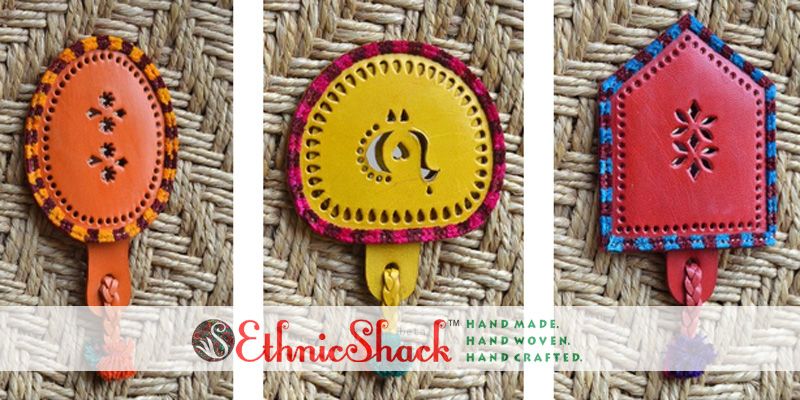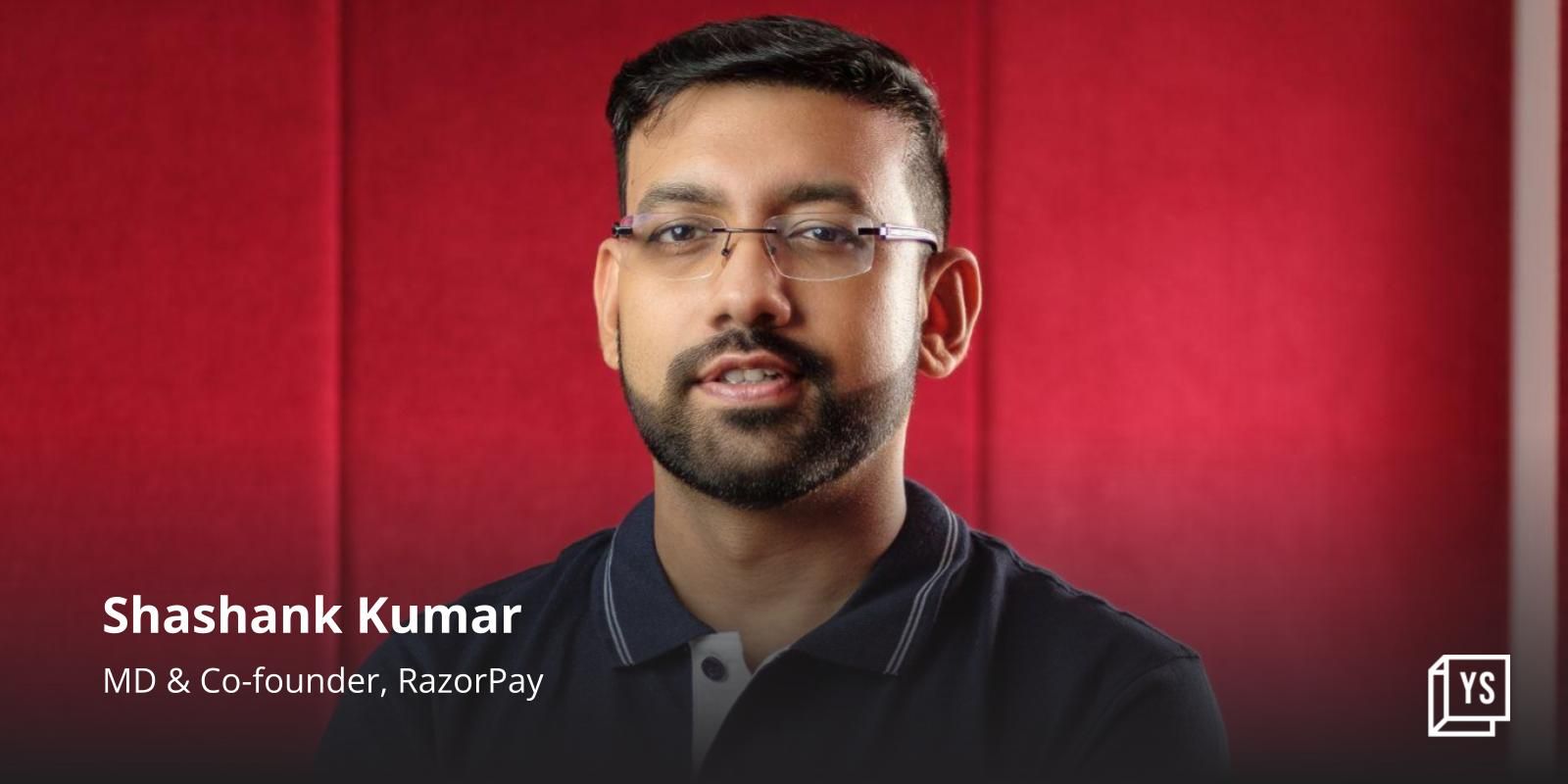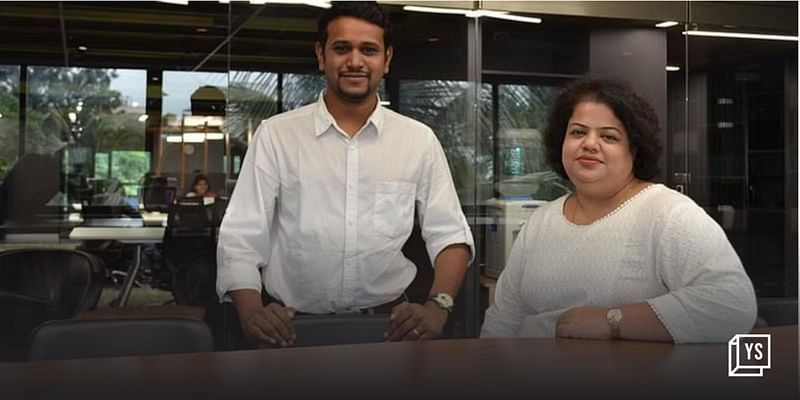How Srijata Bhatnagar founded EthnicShack to bring handicrafts back into 21st century lifestyles
Srijata Bhatnagar had a plush job in online product management at ESPN Cricinfo – but being a rebel at heart, her soul searching eventually led her to pursue her passion, handicrafts. She also blended this with a drive to do something measurable and unique for artisans and craftsmen. She launched EthnicShack as a venture which blends cool and rustic, traditional and modern. Srijata joins a range of passionate ‘artrepreneurs’ in India (see my earlier article) and shares her vision and journey in this exclusive interview with YourStory – along with tips and recommendations for aspiring entrepreneurs.

YourStory: Tell us a bit about where you grew up, and how your family may have influenced your startup instincts.
SB: I was born in West Bengal. As my father had a transferable job I was never able to get too comfortable with my surroundings, environment, friends, neighbourhood and so on. Every time I got comfortable with my surroundings, I would be uprooted and planted in a new place again. This probably has had a great influence in shaping me as a person, making me more confident of facing the unknown and enjoying it. When you don’t have any option but to embrace change, you tend to appreciate small things in life. You grow up with a more open mind. You look at things from more unbiased point of view.

Apart from that, fortunately I hailed from a family which had a solid value system. Though my paternal grandmother couldn’t go to school after a certain age, she was an avid learner. She would always ask for my text books to learn something new. My grandfather was a renowned doctor and was a well respected man in the town he lived in.
My parents raised me to be a fighter, helping me face the world with confidence. I remember there have been times when I would be bullied by others, mainly boys; it was my father who refused to come to my rescue, instead encouraged me to fight my own battle. My father told me, “Once you become 18 I will throw you out of the house so that you take the big bad world head on!”
And he did. I was sent to hostel after my 12th, and since then I have been living independently. First, Kolkata, then Chennai and finally Bangalore. Bangalore wasn’t a planned move. I was working in Chennai after completing my MBA and that’s when I got married. My husband was searching for his next career move and that’s when he found a lucrative job in Bangalore and I followed him.
When it comes to entrepreneurship, I am the first generation entrepreneur in my family. All my relatives, including my father have worked either in government organisation or in PSUs. My mother was a homemaker. Therefore it is difficult for them to understand corporate culture leave alone entrepreneurship. In fact, I have had various conversations with them regarding my quitting a plush job to take up something so uncertain. Still now, they seem to be skeptical about my move, but try to support me seeing my sincerity and hard work.
YourStory: What was the pain point you wanted to resolve?
SB: Today we are at a juncture where our heritage and traditional cottage industry are at risk. The power of the machine is copying the handmade wonders and making the art look cheap by imitating the design, art and print. Guess what, now many products and designs look the same.
Many of these machine made products are also marketed as ‘handmade’. Obviously, nothing can replace a truly handmade product. Every handmade product is unique, special and made with love. There are no two products that look the same.

Some consumers are slowly losing faith in authentic handmade products. Plus there is a stereotype that handmade products lack the cool quotient, or that they are boring and not so fashionable and cannot be used in our daily life.
On the contrary, we have found that real and authentic handmade products are quite cool to use, because they are unique, made by skilled craftsmen/artisans and therefore, extremely fashionable. Consumers are soon finding out the truth that they have been tricked to buy ‘look alike’ products and not the real handmade products. Many of the handmade products use natural colours and materials to produce them which makes it eco-friendly and good for your skin.
We have found the Indian handicrafts industry having answers for almost every need of our daily life. And this is where we wanted to play a role. We want to bring this real goodness back in our daily lives. We want today’s generation to understand the benefits of using these products regularly and cherish them. We want them to patronize and support this initiative so that we can make less fortunate folks more employable, bring joy in their life too. We can make the craftsmen/artisans know what they do is amazing and they need to continue doing it for the larger benefit of everyone in the ecosystem.
YourStory: What were you doing before you started EthnicShack, and why did you change?
SB: It was sometime in 2011, when I left my plush job in online product management at ESPN Cricinfo, for soul searching. Prior to this, I worked for Sulekha, ClickJobs, BharatMatrimony, IndiaProperty and other startups. After a couple of unsatisfactory job changes and two years of soul searching, I decided to pursue my dream to become an entrepreneur.
I have always been a person who loved to take the road less travelled – a rebel at heart, refusing to get tied up by mediocrity of life. So, a comfy job with a multinational didn’t provide me the satisfaction and drive I needed to feel in charge.
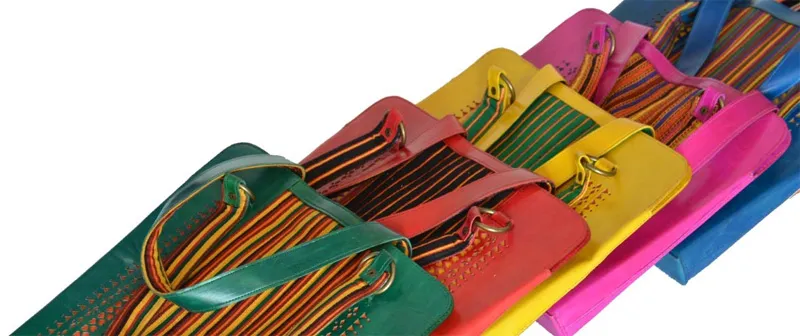
EthnicShack happened to me naturally. I was always thrilled about handmade, handwoven, handpainted and handcrafted products, wanted to do something measurable and unique for artisans and craftsmen. I also wanted to give back to the community we live and make it a little better place for all of us. And EthnicShack seemed to be the answer to combine both. I went ahead and launched www.ethnicshack.com in September 2013. After that there has been no looking back.
YourStory: How did you go about addressing the opportunity?
SB: We spoke to people trying to understand if they really care about handmade unique stuffs, if they would buy them given a choice of authentic products in reasonable prices. We also did a pilot where we held our first offline exhibition on 15th August 2013, and the response was overwhelming. This gave us confidence and we went ahead and launched our e-commerce portal ‘EthnicShack.com’ in September 2013.
Our mission is three-fold: 1. Break the stereotype of handmade perceived as being not so cool. 2. Make and market real fashionable handmade products that can be used in our daily lives. 3. Support the cottage industry by popularizing the crafts and bringing handmade products into mainstream fashion and lifestyle.
YourStory: How did you choose the company name and its base?
SB: We chose Bangalore as our base mainly because of its friendly ecosystem. Being first time entrepreneurs we wanted to be as close as possible to the ecosystem and learn from fellow entrepreneurs quickly. Plus as our main business model is e-commerce, so Bangalore happened to be the right choice.
The brand name ‘Ethnic’ was obvious; there were no alternative. ‘Ethnic’ stands for anything made in traditional or ethnic ways. It is what we wanted to give our customers in the purest form possible. But, we had to bring the modern, cool yet casual and not-so-sophisticated aspect into the brand and that’s how ‘Shack’ was infused. The EthnicShack name was thus born.
Plus as most of the handicrafts are made by in huts or shacks, the name seemed to characterize the brand perfectly. Since we also wanted to give consumers reasonably priced products that can be used by the mass market, ‘Shack’ was used. When we sat down to come up with a logo to represent the brand, we wanted our belief and value of the brand to be represented in the logo.

The font used in ‘EthnicShack’ text in the logo symbolizes the smooth, curvy, bright yet classy feel of Ethnic. The ‘S’ symbolizes The Great White Royal Swan which is a symbol of beauty, artistic inspiration, purity par excellence, peace, god and the vehicle of Goddess Saraswati as per Indian mythology. It has reference to many other mythologies, has depiction in coins of many countries, and is recognised as the national bird for countries like Russia, Finland, Denmark and others. According to Indian mythology, the swan is able to separate milk from water, and drink the milk alone. Like the Great White Swan we too wanted to bring to you only the authentic handmade products, therefore we chose this as part of our logo.
The circle around ‘S’ stands for the world. The design patterns in the circle symbolizes the rich, vibrant, traditional, simple, royal, natural, classy, modern, dynamic colours we see in any ethnic culture and tradition across the globe. The swan in the logo also has the letter ‘E’ – Ethnic (observe the tail of the swan) and ‘S’ – Shack.
YourStory: Who else is on your founding team?
SB: As they say charity begins at home! Therefore instead of searching for a co-founder outside, I went ahead and shared my idea with my real life partner Aneesh, and he was simply kicked about it and very excited. He is a person with artistic inclination, an engineer as well as a person with flair for brand management and marketing. He has worked with technology companies as well as advertising and media companies. Presently, it is both of us driving EthnicShack with a couple of others assisting us in various capacities. However, we are also constantly looking for like-minded folks who are driven for the cause and are ready to share their passion to help take this initiative to next level.
YourStory: What is your core offering? How has this evolved since founding?
SB: Our core offerings currently are apparels and accessories. Initially it started with only handmade sarees. Quickly we realized that it would take some time for us to bring back the saree in our daily lives, so we also concentrated on other products like dupattas, stoles, salwar-kameez sets, handbags, statues, home decor, wall hangings, blankets and so one. We wanted to stay away from anything that deals with size in the initial stages to reduce challenges with returns due to fitting issues. Now that we are up and running and extending our products rapidly, we are soon coming out with our range of kid’s wear, and want to get into men’s clothing soon.
YourStory: Who is your target audience, and how are you reaching out to them?
SB: The main target audience is today’s multitasking and dynamic generation. Presently our products are targeted towards urban women living in Tier 1 or Tier 2 cities in India with Internet access. We also target men who want to gift unique handmade gifts to their loved ones. Though we don’t actively promote to the international audience, we have had many shipments to USA, Qatar and UAE. There are some customers living abroad who request us to ship to their family and friends in India who can carry it for them.
YourStory: What impact are you having?
SB: Presently we are helping the small scale and grassroots level artisans in rural areas of Andhra, Gujarat, Rajasthan, Madhya Pradesh, Chhattisgarh, Bihar and West Bengal by working with them directly. We provide them with design inputs, global and Indian market trends and needs, and co-create the products that are saleable in today’s market. They are our extended business family.
We are looking to scale big time this year. We want to increase the number of artisans we work with and also want to bring the artisans sitting in remote villages of North-east, Rajasthan, Kerala and elsewhere under the EthnicShack umbrella.
We also want to increase our sales this year, three times more than last year. This is an ambitious target, and we are hopeful to achieve it if we have some financial and operational backing from like minded people.
YourStory: What is your business model as a social enterprise?
SB: We only work with handicrafts artisans and craftsmen directly and avoid working with middlemen. We believe in fair trade and give them their due. We partner with them and work in complete collaboration with them. This way we are always rooted to their problems, but do not lose the customer focus. Also, we find this model is beneficial to the artisans/craftsmen at large.
YourStory: Who else is in this space, and how do you differentiate from them?
SB: There are quite a few players in the market presently, including the biggies like Indianroots and Fabindia. On the other hand, there are startups like Jaypore and iTokri. However, most of them are trying to be the marketplace, hosting other sellers in their platform.
We believe that even though the place may get crowded, everyone can do well and exist harmoniously. The best part of this space is it works on collaboration and extending a helping hand to pull others up, and not on competition and pushing others from this space.
As a policy, we want to build a brand that is synonymous to authentic handmade, handcrafted and handwoven products. And affordable to the masses including today’s affluent urban middle class. We want to take the responsibility that the quality and value customers get matches with the quality and value they are looking for from these products. At the same time we also want to see to that these masterpieces get the recognition, love and appreciation they deserve. Overall, it will lift the quality of life for them.
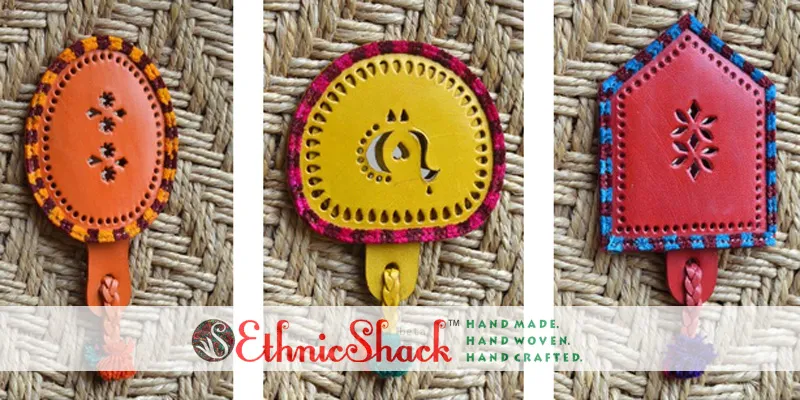
YourStory: How have you been funded?
SB: We are fully bootstrapped and funding this initiative mainly with personal savings. However, in the long run we would need to look for funds outside to boost up the operations and grow faster. We are not profitable yet, but optimistic to become profitable soon.
YourStory: What kind of media coverage are you receiving so far?
SB: We have been covered in ‘Plan Your Wedding’ magazine’s April issue, where we talk about different ways of draping the saree, and how the saree can be brought back to our daily lives.
I got featured in the KartRocket Women’s Day special blog titled ‘Leading Women in Indian E-commerce’. So far we have shied away from large scale media coverage, as we wanted to first focus on the initiative and its building blocks, before going all out with it.
YourStory: How are you balancing all this work with your family life?
SB: It’s because of my parents’ help and my husband’s support that I could make this a reality even though I have a five year old daughter at home. My husband happens to be my best buddy, I have known him for more than 12 years now and we have grown together through thick and thin. He has always been my partner in crime; and fortunately we have a lot in common but our personalities are poles apart! I think this trait helps us be the perfect complement to each other.
He and my five year old daughter are my biggest critic. It’s their unbiased feedback, criticism and analytical explanation makes me to do even better each time. We are lucky that our daughter loves arts and crafts as much as we do. We will introduce her to the world of Indian handcrafted wonders soon and hope she will find it exciting enough to take it forward!
YourStory: If you could back in time, what would you do differently the second time round?
SB: We believe in never looking back and regretting in life! Everything happens for good and there is a purpose for everything. But yes, if we could have started with a bigger investment and a solid team of doers, it would have been great.
YourStory: What is your advice/recommendations to other entrepreneurs, and to society at large?
SB: People starting up on bootstrapping should remember that if you don’t have sufficient amount of savings and/or other source of income and/or a partner to back up for your expenses, it is going to be extremely tough to survive. Entrepreneurship can be very, very demanding and challenging. Unless you are totally, madly and completely in love with challenges please don’t get into it. This is not for people who love a calm and hassle free life. We like to look at it like this: “If you are a person who likes a lazy river rides, entrepreneurship is not for you. If you prefer roller coaster rides instead, then only jump into it!”
We have been taking advantage of modernisation and urbanisation and becoming too comfortable to even remember where our roots are. In a hurry to copy and replicate the Western world and everything artificial, we are ignoring the goodness of nature and traditional ways for which we are known for centuries. It’s high time we wake up, preserve and nurture what has been our strength and start living harmoniously, else there will be a time when our children will not have a social cover when they need one.






